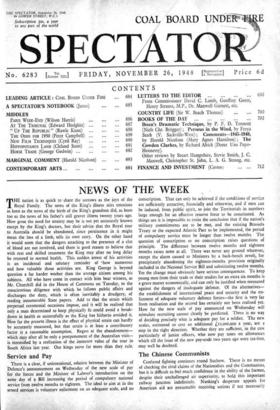Service and Pay
There is a clear, if unintentional, relation between the Minister of Defence's announcement on Wednesday of the new scale of pay for the forces and the Minister of Labour's introduction on the same day of a Bill increasing the period of compulsory national service from twelve months to eighteen. The ideal to aim at in the armed services is voluntary enlistment on an adequate scale, and no
conscription. That can only be achieved if the conditions of service are sufficiently attractive, financially and otherwise, and if men can be induced, from public spirit, to join the Territorials in numbers large enough for an effective reserve force to be constituted. As things are it is impossible to resist the conclusion that if the nation's military commitments are to be met, and the existing Brussel& Treaty or the expected Atlantic Pact to be implemented, the period of compulsory service must be longer than twelve months. The question of conscription or no conscription raises questions of principle. The difference between twelve months and eighteen months raises none at all. There was never any ground whatever, except the alarm caused to Ministers by a back-bench revolt, for precipitately abandoning the eighteen-months provision originally included in the National Service Bill and substituting twelve months. Yet the change must obviously have serious consequences. To keep young men from their trade or their studies for an extra six months is a grave matter economically, and can only be justified when measured against the dangers of inadequate defence. Of the alternatives— the establishment of international peace and security and the en- listment of adequate voluntary defence forces—the first is very fat from realisation and the second has certainly not been realised yet. How far the new scale of pay announced on Wednesday will stimulate recruiting cannot clearly be predicted. There is no way of deciding precisely what is adequate pay for a soldier. The new scales, estimated to cost an additional £12,000,000 a year, are a step in the right direction. Whether they are sufficient, in the cast particularly of junior officers, who now pay taxes on allowances which till the issue of the new pay-code two years ago were tax-free, may well be doubted.




































